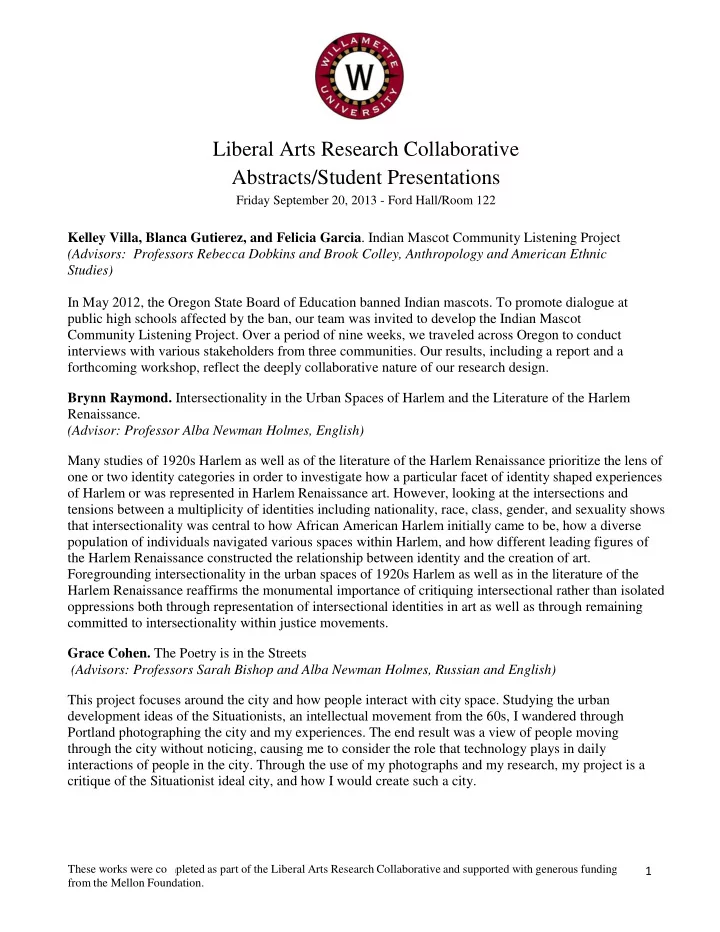

Liberal Arts Research Collaborative Abstracts/Student Presentations Friday September 20, 2013 - Ford Hall/Room 122 Kelley Villa, Blanca Gutierez, and Felicia Garcia . Indian Mascot Community Listening Project (Advisors: Professors Rebecca Dobkins and Brook Colley, Anthropology and American Ethnic Studies) In May 2012, the Oregon State Board of Education banned Indian mascots. To promote dialogue at public high schools affected by the ban, our team was invited to develop the Indian Mascot Community Listening Project. Over a period of nine weeks, we traveled across Oregon to conduct interviews with various stakeholders from three communities. Our results, including a report and a forthcoming workshop, reflect the deeply collaborative nature of our research design. Brynn Raymond. Intersectionality in the Urban Spaces of Harlem and the Literature of the Harlem Renaissance. (Advisor: Professor Alba Newman Holmes, English) Many studies of 1920s Harlem as well as of the literature of the Harlem Renaissance prioritize the lens of one or two identity categories in order to investigate how a particular facet of identity shaped experiences of Harlem or was represented in Harlem Renaissance art. However, looking at the intersections and tensions between a multiplicity of identities including nationality, race, class, gender, and sexuality shows that intersectionality was central to how African American Harlem initially came to be, how a diverse population of individuals navigated various spaces within Harlem, and how different leading figures of the Harlem Renaissance constructed the relationship between identity and the creation of art. Foregrounding intersectionality in the urban spaces of 1920s Harlem as well as in the literature of the Harlem Renaissance reaffirms the monumental importance of critiquing intersectional rather than isolated oppressions both through representation of intersectional identities in art as well as through remaining committed to intersectionality within justice movements. Grace Cohen. The Poetry is in the Streets (Advisors: Professors Sarah Bishop and Alba Newman Holmes, Russian and English) This project focuses around the city and how people interact with city space. Studying the urban development ideas of the Situationists, an intellectual movement from the 60s, I wandered through Portland photographing the city and my experiences. The end result was a view of people moving through the city without noticing, causing me to consider the role that technology plays in daily interactions of people in the city. Through the use of my photographs and my research, my project is a critique of the Situationist ideal city, and how I would create such a city. These works were completed as part of the Liberal Arts Research Collaborative and supported with generous funding 1 from the Mellon Foundation.
Jonny Saunders . Jouis-Sense: Violence from Meaning, Meaning from Violence (Advisor: Professor Sammy Basu, Politics) The first to die in war is not Truth, it is the first to be born. In any war an initial symbolic onslaught must be successful to form a common, true, understanding of evil before any bullets are fired. This symbolic violence takes place at the level of language, imposing a 'universe of meaning' which gives structure to later objective violence. By recasting violence in Nazi Concentration Camps as an expression and re-transmission of a system of meaning, I explore the creation and propagation of violent systems themselves. My argument prods at the answers to the questions it begs: how does violence become, to us, seemingly inevitable or necessary; how do we become subjects of violence, and most fundamentally, what does violence mean? Katie Hamburg . Nazism as Romantic Comedy. (Advisor: Professor Sammy Basu, Politics) The purpose of this research project was to examine the political significance and implications of popular German films of the 1930s and 1940s. What can we learn from the themes of entertainment films, specifically comedies, about the political visions at stake under the late Weimar and Nazi regimes? How are heroism and laughter represented in relation to modernity and the demands of a functioning society? Themes of the romanticized past, conformity, and exclusionary group laughter were used as lenses through which to compare and analyze the comedies Lachende Erben (1933) and Die Feuerzangenbowle (1944). While the themes in both films suggest that their political visions were in a state of turbulence and decline, the circumstances of Lachende Erben allowed for the articulation of reconciliation and the possibility of a promising democratic future, whereas the circumstances surrounding Die Feuerzangenbowle only allowed for a reactionary, nostalgic escape into the past and denial of crisis. Natalie Lyman . Love & Romance in 21 st -Century Hollywood Superhero Films (Advisor: Professor Huike Wen, Chinese) Superhero films and media culture constitute America’s contemporary mythology, taking elements from world cultures and mythologies to combine/remake them in fictional worlds heavily influenced by science-fiction and technological advancement. Since 2000, more than eighty Hollywood films and several TV shows focused on superheroes have appeared in the U.S. – and all of them include themes of romantic and other types of love. Yet, this topic remains almost entirely unexplored in the scholarly literature on superheroes and comics culture. Why is love so important to superheroes, and furthermore, what is “love” in the superhero universe? How realistic are these images of love, partnership, and family that today reach a massive audience and gross billions of dollars in the movie industry? This project explores the 21 st -century Hollywood superhero film in terms of popular media myths about love and romance, as well as themes and qualities of love specific to the superhero genre. Issues of gender and spectatorship are also considered. Kerry Lee . A Hero that Travels Through Time (Advisor: Professor Huike Wen) Although Korean media tends to have a more conservative style when expressing love or romance for viewers, it is still able to present a romantic character that viewers find desirable. Due to this in the last These works were completed as part of the Liberal Arts Research Collaborative and supported with generous funding 2 from the Mellon Foundation.
Recommend
More recommend